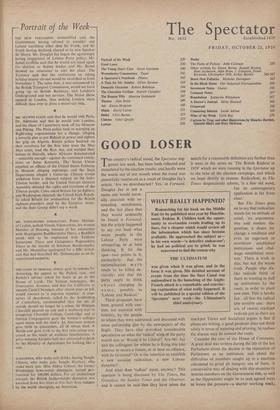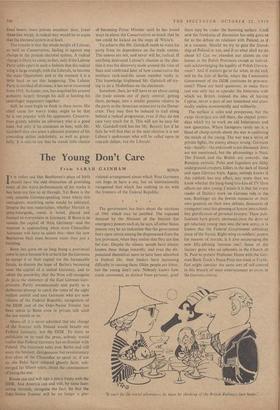GOOD LOSER
MHE country's radical mood, the Spectator sug-
WHAT REALLY HAPPENED?
Researching for his book on the Middle East (to be published next year by Hutchin- sons), Erskine B. Childers took the oppor- tunity to re-examine events leading up to Suez, for a chapter which would review all the information which has since become available. He approached the subject as— in his own words—`a detective endeavour'; he had no political axe to grind; he was concerned to find the reason why THE ULTIMATUM was given when it was given, and in the form it was given. His detailed account of events from the time the Suez Canal was nationalised to the launching of the Anglo- French attack is a remarkable and convinc- ing explanation of what really happened. It will be published in a special edition of the `Spectator' next week—the Ultimatum's third anniversary.
search for a reasonable definition any farther than it went in the series on 'The British Radical in 1959' which we were running in the Spectator up to the time of the election campaign, and which we hope shortly to resume. Radicalism, as The Times despondently admits, 'is a fine old word, but its contemporary application is far from clear.'
But The Times goes on to say that radicalism stands for an attitude of mind; 'an argumenta- tive and restless dis- position, a desire for change, a readiness and even an eagerness to overthrow established institutions and chal- lenge established inter- ests.' There is truth in this; but not the whole truth. People who dis- like radicals think of them as wanting to pull up institutions by the roots, in order to plant new ones. This is hardly fair : all that the radical (the sensible one : there are, of course, crackpot radicals just as there are These proposals have been greeted with cau- tion, not unmixed with hostility, by the people to whom they were addressed; and discussed with some patronising glee by the newspapers of the Right. They have also provoked considerable speculation on what the 'radical' wing of the party would aim at. Would it be Liberal? Are Mr. Jay and the colleagues for whom he is flying this kite anxious to secure a fusion, or at least an alliance, with Jo Grimond? Or is the intention to establish a new socialist radicalism; a new Labour dynamic?
And what does 'radical' mean, anyway? This question is being discussed by The Times, the Guardian, the Sunday Times and the Observer; and it cannot be said that they have taken the crackpot Tories and Socialists) argues is that if plants are wilting, a good gardener does not think solely in terms of watering and pruning; he realises the disease may lie around the roots.
Consider the case of the House of Commons. A great deal was written during the life of the last Parliament about the decline in the reputation of Parliament as an institution, and about the difficulties of members caught up in a machine calculated to grind all integrity out of them. A conservative way of dealing with this situation (it worries members on the Government side, as well as the Opposition) might be to seek agreed ways to lessen the pressure—a shorter working week;
fixed hours; more private members' time; fewer three-line whips. A radical way would be to argue that the electoral system is at fault.
The trouble is that the whole weight of Labour, as. well as Conservative, feeling is against any change in the present electoral system. A radical change is likely to come, in fact, only if the Labour Party splits apart in such a fashion that the radical wing is large enough, with the Liberals, to become the main Opposition; and at the moment it is a little hard to see this happening. The Labour Party is terrified Of division; it has never recovered from 1931. Its leader, too, has acquired his present authority largely through his skill at holding his centrifugal supporters together.
Still, he must begin to think in these terms. His chief cause for worry today ought to be that he is too popular with his opponents. Conserva- tives greatly admire an adversary who is a good loser, but only if he continues to lose; with Mr. Gaitskell they can sense a pleasant prospect of his conceding defeat indefinitely, as well as grace- fully. It is sale to say that he stands little chance of becoming Prime Minister until he has found ways to alarm the Conservatives so much that he too could be kicked on the steps of White's.
To achieve this Mr. Gaitskell needs to wean his party from its dependence on the trade unions. The unions are not, and never will be, radical, If anything destroyed Labour's chances at the elec- tion it was the discovery made around the time of Suez and confirmed later of how conservative the ordinary rank-and-file union member really is. This knowledge frightened Mr. Gaitskell off try- ing to do a Midlothian on the.electorate.
Somehow, then, he will have to set about easing the trade unions out of party control; getting them, perhaps, into a similar position relative to the party as the American unions'are to the Demo- crats. They may then be induced to trail along behind a radical programme, even if they do not care very much for it. This will not be easy for Mr. Gaitskell (still less for Mr. Bevan); but if he fails he will find that at the next election it is not Labour's spokesman who will be called upon to concede defeat; but the Liberals'.







































 Previous page
Previous page